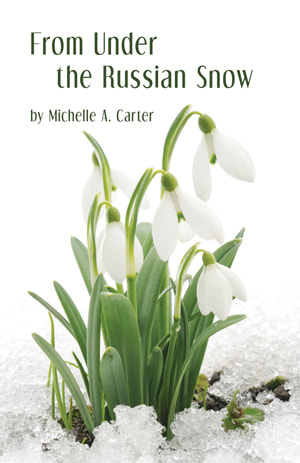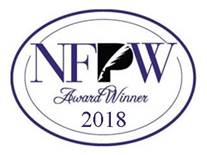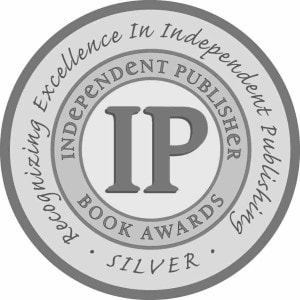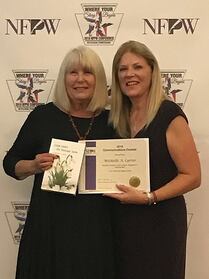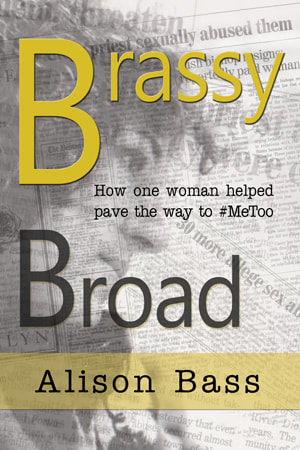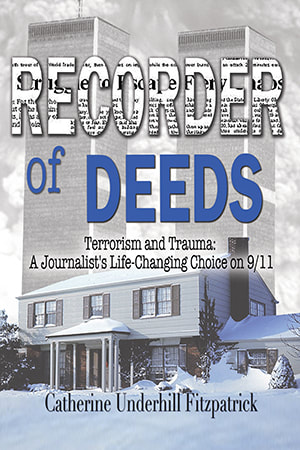Buy
DetailsBink Books
210 pp. ● 5.5×8.5 $14.95 (pb) ● $8.99 (eb) ISBN (pb) 978-1-945805-44-8 BIOGRAPHY & AUTOBIOGRAPHY / Editors, Journalists, Publishers HISTORY / Russia & the Former Soviet Union Publication date: September 2017 |
|
A memoir from Russia’s bubble of freedom in the pre-Putin era.
Michelle Carter at age fifty, married and the mother of two children in their early twenties, left her job as managing editor of a suburban daily newspaper in the San Francisco Bay area in 1995 to move to Russia for a year as a United States Information Agency Journalist-in-Residence. There she traveled across the eleven time zones of this complex country, working with newspaper editors who struggled to adapt to the new concepts of press freedom and a market economy. She became an on-the-scene witness to the second great Russian revolution. She viewed Russia from her flat on the embankment of the Moscow River and from her sometimes humorous shoulder-to-shoulder participation in the life of the largest country in the world. At the same time, she embarked on a personal journey that wrenched her life in a way she could never have anticipated when she accepted her husband’s challenge to take this assignment and culminate her eight years of work and travel in the former Soviet Union. |
Visit
|
-
Praise
-
In the Media
-
Excerpt
-
For Reading Groups
<
>
“Carter’s book certainly delivers the promised depiction of her professional efforts in a dramatically changing country at an extraordinary historical time . . . From Under the Russian Snow provides insights into a different culture and into people like ourselves, with families, friends, jobs, struggles, losses, and resilience.” — Phoebe Tussey, Reviewer, Story Circle Book Reviews
“From Under the Russian Snow offers an unexpected, first hand look at a Russia which with few readers are acquainted, but will not soon forget, thanks to this superb memoir by Michelle A. Carter.” — Vianvi Podcast Book Review 17 of 2017 by Viga Boland
“From Under the Russian Snow reflects in its title a symbol of the awakening of Russia, the time of hope, expectation and enthusiasm of the people who had never experienced freedom. Michelle Carter came to Russia at this turbulent and exciting period and generously shared with us her knowledge of how to shed the mental fetters of the past. Michelle was not an outsider or just a visitor; she was one of us. She is a talented educator, sensitive and understanding woman and a keen observer. The book she has written depicts with love and sympathy the attempts to build a new Russia. It’s about love, life and tragedy—hers and ours.” — Anna Sharogradskaya, Director, Regional Press Institute, St. Petersburg, Russia
“Michelle Carter’s writing is always crisp and evocative, and her work with the children of Chernobyl was nothing less than heroic.” — Congresswoman Jackie Speier (CA-14)
“I know that you have come to the close of your time as professional-in-residence at the Russian-American Press and Information Center and will shortly return to the United States. I would like to take this opportunity to thank you for the many contributions you have made during your tenure at RAPIC toward bettering Russian journalists’ understanding of how a free press works in a democratic society. The book you just published on newspaper design and layout is an impressive result of your time in Russia. “I would also like to thank you for your dedication to your position, despite the enormous loss you suffered this summer. During a time of personal tragedy, you remained committed to your work here. That is both remarkable and truly commendable . . .” — Thomas R. Pickering, Ambassador to Russia, Embassy of the United States, Moscow, Russia, November 14, 1995
“From Under the Russian Snow offers an unexpected, first hand look at a Russia which with few readers are acquainted, but will not soon forget, thanks to this superb memoir by Michelle A. Carter.” — Vianvi Podcast Book Review 17 of 2017 by Viga Boland
“From Under the Russian Snow reflects in its title a symbol of the awakening of Russia, the time of hope, expectation and enthusiasm of the people who had never experienced freedom. Michelle Carter came to Russia at this turbulent and exciting period and generously shared with us her knowledge of how to shed the mental fetters of the past. Michelle was not an outsider or just a visitor; she was one of us. She is a talented educator, sensitive and understanding woman and a keen observer. The book she has written depicts with love and sympathy the attempts to build a new Russia. It’s about love, life and tragedy—hers and ours.” — Anna Sharogradskaya, Director, Regional Press Institute, St. Petersburg, Russia
“Michelle Carter’s writing is always crisp and evocative, and her work with the children of Chernobyl was nothing less than heroic.” — Congresswoman Jackie Speier (CA-14)
“I know that you have come to the close of your time as professional-in-residence at the Russian-American Press and Information Center and will shortly return to the United States. I would like to take this opportunity to thank you for the many contributions you have made during your tenure at RAPIC toward bettering Russian journalists’ understanding of how a free press works in a democratic society. The book you just published on newspaper design and layout is an impressive result of your time in Russia. “I would also like to thank you for your dedication to your position, despite the enormous loss you suffered this summer. During a time of personal tragedy, you remained committed to your work here. That is both remarkable and truly commendable . . .” — Thomas R. Pickering, Ambassador to Russia, Embassy of the United States, Moscow, Russia, November 14, 1995
“Michelle Carter’s most ‘remarkable’ and ‘difficult’ year in a book: ‘From Under the Russian Snow’” After Hours with Rick Kogan, WGN Radio
“Author captures snapshot of short freedoms,” by Sarah Griego Guz, Half Moon Bay Review
‘From Under the Russian Snow’ brings a new perspective on post-Soviet Russia,” by Andrew Shen, Scot Scoop News
“Shout Out: Michelle A. Carter, author headed to Oak Park library” — Chicago Tribune
“Authors Luncheon: Something to Smiley About,” by Amy Maginnis-Honey, Daily Republic
“The Better Part – From Under The Russian Snow” — KMVT Show, The Better Part
“Former editor reflects on life in journalism: Local news pro turned author Michelle Carter focuses on her life’s journey in new memoir,” By Anna Schuessler, The Daily Journal (San Mateo, California)
I CLOSED THE door, snapped the deadbolt, and listened to the voices in the hall.
“Michelle, you must close windows when you leave or the wind will blow and the glass will break. And the drapes, Michelle. Close them to block the sun.”
Beyond the door, my landlady and her son were still chattering, in Russian, still reminding me to turn off the gas and set the safety lock when I left the building, still worrying about turning over their apartment to this American woman who had come to Moscow alone, without her family. I was only getting every third word or so, but they had repeated themselves often enough, complete with demonstrations, that I knew what they were saying.
Still, I loved to hear them say my name. Russians pronounced “Michelle” with a soft, rolling “l” at the end, and it sounded much more elegant in Russian than it did in English. And as often as my landlady repeated it, she must have liked to say it, too.
I shouted after them, “I will, I will,”—just about the limit of my Russian after more than twenty-four hours of travel.
Then the doors to the lift clanked shut, the voices ceased, and I really was alone. I turned around slowly. There, leaning against the cushioned Naugahyde of the door of my flat, I could see into all three rooms of the apartment.
I could see past the toilet (in a separate European-style “water closet”) and bathroom, through the cozy kitchen and out the tall double casement windows into the inky night. The kitchen, with its tiny table in the corner and Harvest Gold German refrigerator/freezer, looked cozy rather than cramped.
I could see the “western” double bed that all but filled the bedroom. With the addition of the free-standing wardrobe and a low cupboard that would serve as a dresser, moving-around space was limited. But again, those lovely windows would bring the outside into the room.
I could see to the left into the largest room where an exquisite Persian carpet in vibrant reds and blues lay over polished wood parquet (and smell the faint residue of a new coat of floor wax). Beyond that, the stacks of packing boxes that had arrived with me filled every bit of free space.
So this would be the setting for my Great Adventure.
“Michelle, you must close windows when you leave or the wind will blow and the glass will break. And the drapes, Michelle. Close them to block the sun.”
Beyond the door, my landlady and her son were still chattering, in Russian, still reminding me to turn off the gas and set the safety lock when I left the building, still worrying about turning over their apartment to this American woman who had come to Moscow alone, without her family. I was only getting every third word or so, but they had repeated themselves often enough, complete with demonstrations, that I knew what they were saying.
Still, I loved to hear them say my name. Russians pronounced “Michelle” with a soft, rolling “l” at the end, and it sounded much more elegant in Russian than it did in English. And as often as my landlady repeated it, she must have liked to say it, too.
I shouted after them, “I will, I will,”—just about the limit of my Russian after more than twenty-four hours of travel.
Then the doors to the lift clanked shut, the voices ceased, and I really was alone. I turned around slowly. There, leaning against the cushioned Naugahyde of the door of my flat, I could see into all three rooms of the apartment.
I could see past the toilet (in a separate European-style “water closet”) and bathroom, through the cozy kitchen and out the tall double casement windows into the inky night. The kitchen, with its tiny table in the corner and Harvest Gold German refrigerator/freezer, looked cozy rather than cramped.
I could see the “western” double bed that all but filled the bedroom. With the addition of the free-standing wardrobe and a low cupboard that would serve as a dresser, moving-around space was limited. But again, those lovely windows would bring the outside into the room.
I could see to the left into the largest room where an exquisite Persian carpet in vibrant reds and blues lay over polished wood parquet (and smell the faint residue of a new coat of floor wax). Beyond that, the stacks of packing boxes that had arrived with me filled every bit of free space.
So this would be the setting for my Great Adventure.
Book Clubs & Reading Groups Discussion Guide
| From Under the Russian Snow Reading Guide | |
| File Size: | 781 kb |
| File Type: | |
From the author
From Under the Russian Snow would be just a female coming-of-(middle)-age story, sprawled across the eleven time zones of pre-Putin Russia, if life hadn’t intervened. Who could pass up a story told by a woman of fifty who embraced a great adventure, without her family, in an exotic setting, only to absorb one of life’s harshest blows?
From Under the Russian Snow would be just a female coming-of-(middle)-age story, sprawled across the eleven time zones of pre-Putin Russia, if life hadn’t intervened. Who could pass up a story told by a woman of fifty who embraced a great adventure, without her family, in an exotic setting, only to absorb one of life’s harshest blows?
|
Discussion Questions
1. How is a memoir different from journalism in which the author made her career? Both genres are true, but a memoir falls into a category called literary non-fiction. Can you recall some examples where the narrative transcends journalism? 2. The author writes in great detail about events that happened more than twenty years ago. Does that add depth and detail or does it cause you to suspend belief? 3. The author was a fifty-year-old American woman living and traveling alone in Moscow. What kind of issues does that raise in you as a reader? Was she brave, foolhardy or perhaps just lucky? 4. The author writes that the Russian press was flowering in that post-Soviet, pre-Putin bubble of freedom. How does that contrast with your understanding of the current situation Russia? 5. The author shares her indecision about going back to Russia after her husband died? Can you understand why she did? 6. At one point, the author characterizes her decision to accept the position in Russia as greedy and self-centered. Could you have made a similar choice? If not, why not? 7. The author draws her title from the podsnezhnik, the first flower to poke through the snow in the early Russian spring. Is it an apt metaphor for this memoir? 8. The author is fairly critical of the treatment of women in Russia. How does this differ from the way women are treated in the rest of the world? 9. A number of different themes are woven through this memoir. How did they speak to you? Were they effective in advancing the narrative? 10. How have your perceptions about Russia changed after reading the book? |
Other Books You Might Like
Books & Imprints |
Information |
Contact |
Proudly powered by Weebly
